The Eurostat citizenship statistics provides a very interesting glimpse into the loss of citizenship in the European union. Between 2008 and 2015 about 29,384 citizenships have been lost/revoked in the EU for various reasons, with two countries Croatia and Lithuania on the top of the list.
Croatia joined the European Union as its 28th member state on 1 July 2013. United Kingdom in third place for stripping citizenships. Citizenship in EU member states can be lost/revoked for several reasons such as dual citizenship restrictions, fraud, treason, threat to the country and voluntarily giving up.
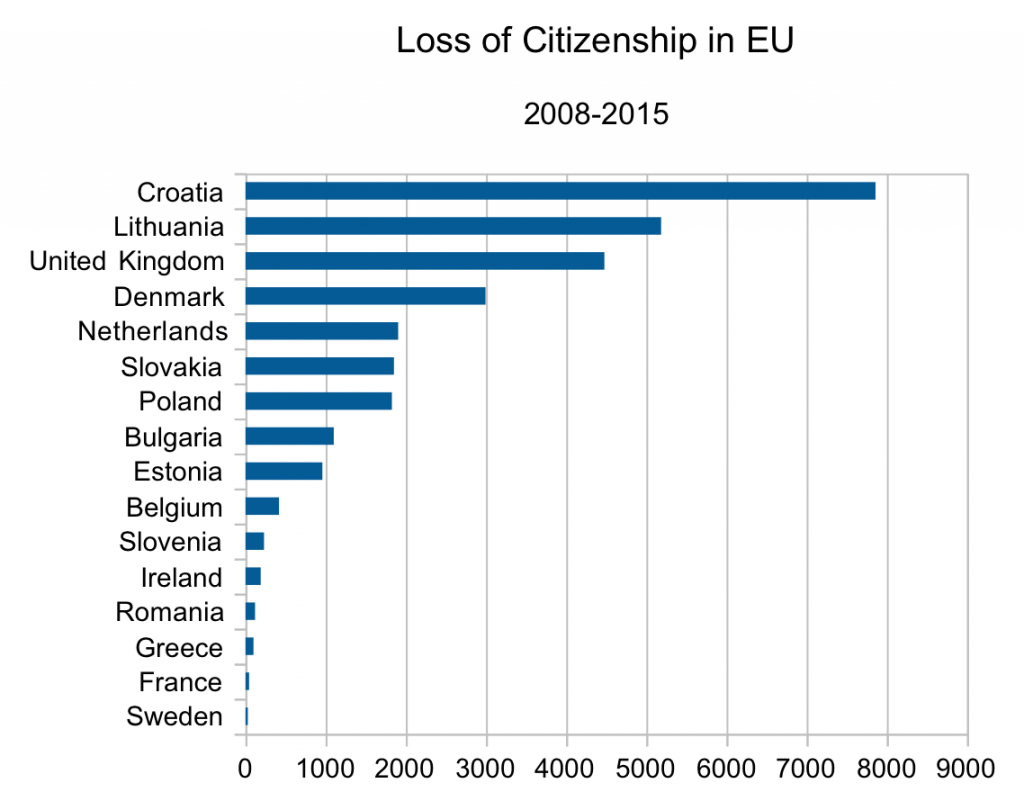
| 2008 | 2009 | 2010 | 2011 | 2012 | 2013 | 2014 | 2015 | Total | |
| Croatia | 1,694 | 1,352 | 1,231 | 1,442 | 1,051 | 537 | 264 | 287 | 7858 |
| Lithuania | 835 | 878 | 580 | 614 | 440 | 431 | 800 | 606 | 5184 |
| United Kingdom | 585 | 567 | 596 | 491 | 604 | 598 | 609 | 426 | 4476 |
| Denmark | 359 | 404 | 417 | 291 | 308 | 346 | 470 | 399 | 2994 |
| Netherlands | 293 | 291 | 361 | 355 | 440 | : | : | 164 | 1904 |
| Slovakia | 182 | 182 | 260 | 351 | 334 | : | 278 | 264 | 1851 |
| Poland | 428 | 281 | 354 | 310 | 315 | 95 | 22 | 21 | 1826 |
| Bulgaria | 194 | 140 | : | : | : | 238 | 155 | 374 | 1101 |
| Estonia | 29 | 115 | 123 | 101 | 119 | 145 | 184 | 143 | 959 |
| Belgium | 73 | 59 | 43 | 54 | 55 | 41 | 49 | 44 | 418 |
| Slovenia | 31 | 32 | 13 | 35 | 37 | 23 | 31 | 29 | 231 |
| Ireland | 0 | 32 | 24 | 30 | 32 | 38 | : | 34 | 190 |
| Romania | : | 119 | : | : | : | : | : | : | 119 |
| Greece | 7 | 45 | 27 | 20 | : | : | : | : | 99 |
| France | 45 | : | : | : | : | : | : | : | 45 |
| Sweden | 0 | 3 | 5 | 2 | 6 | 6 | 3 | 4 | 29 |
According to European Parliament, Citizenship describes a legal bond between a person and a state.
Citizenship is a complex legal and socio-political concept with three major components:
- legal status,
- rights and obligations, and
- national identity.
The most important citizenship rights are the right to vote in and to stand in elections, the right to return to one’s country of citizenship and the right to seek diplomatic protection while abroad.
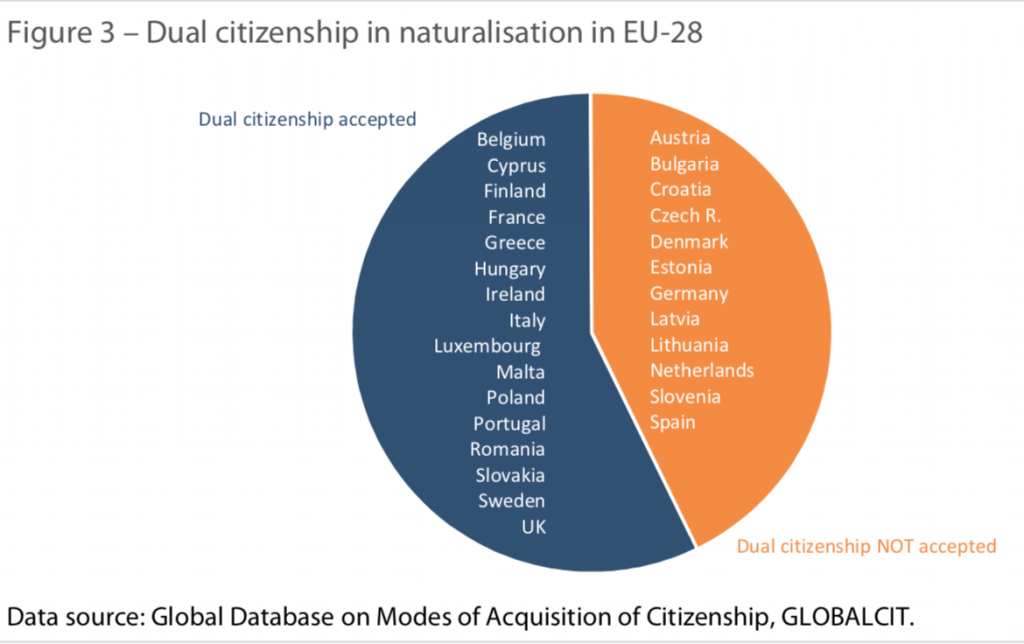
Involuntary loss of citizenship
Citizenship laws provide for a variety of grounds for the involuntary loss of citizenship. The most important of these are: maintaining residence abroad, voluntarily acquiring another citizenship, taking up service in a foreign army or rendering services to foreign countries, committing acts of disloyalty or treason, and acquiring citizenship fraudulently.
All EU countries, except for Croatia, Poland and Sweden, provide for the withdrawal of citizenship in cases of discovered fraud in the acquisition of citizenship (see Figure 5).
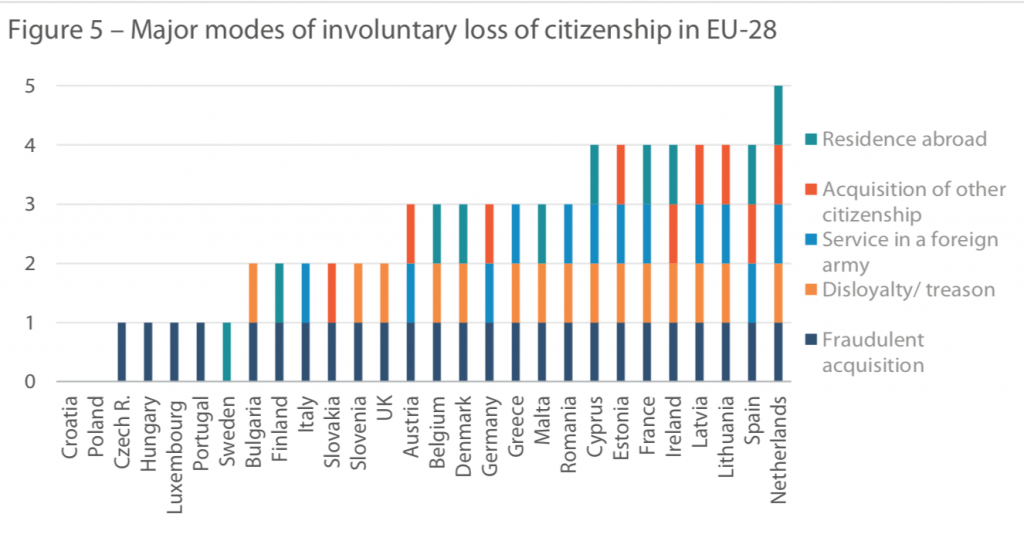
- In 12 EU countries, persons can be deprived of citizenship if they take service in a foreign army.
- Prolonged residence abroad is grounds for the involuntary loss of citizenship in 10 EU countries. However, in Cyprus, Ireland and Malta, this applies only to naturalised citizens, whereas in Belgium, Denmark, Spain and Sweden it only concerns citizens who were born abroad.
- The acquisition of another citizenship can lead to the withdrawal of citizenship in nine EU countries: Austria, Estonia, Germany, Ireland, Latvia, Lithuania, the Netherlands, Slovakia and Spain.
- In 15 EU countries, citizenship can be revoked on grounds of treason or disloyalty. The actions covered by these grounds include: committing serious crimes against the country (Belgium, Bulgaria, Denmark and the Netherlands); acting against a country’s constitutional order and institutions (Denmark, Estonia, France, Latvia and Lithuania); showing disloyalty by act or speech (Cyprus, Malta and Ireland); and, more generally, acting against national interests (Greece, France, Romania, Slovenia and the UK).
- In Belgium, Bulgaria, Cyprus, Estonia, France, Ireland, Lithuania and Malta, these grounds for revocation apply only to naturalised citizens.
- Involvement in terrorist activities are explicitly mentioned as reasons for withdrawal of citizenship in France and the Netherlands.
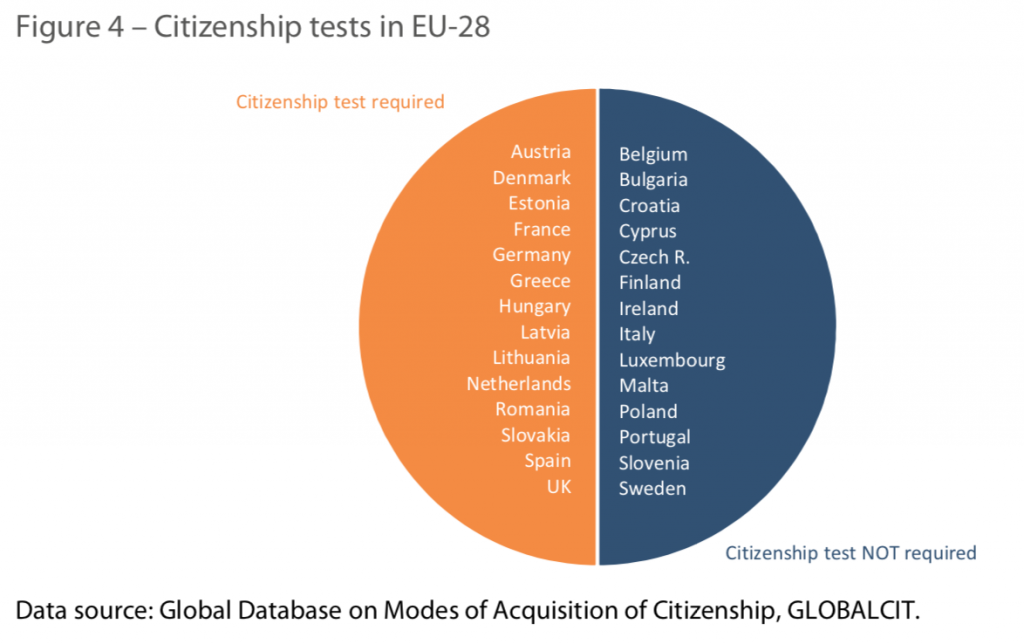
Deprivation of citizenship
Recent terrorist attacks on European soil and the subsequent intensification of security concerns among citizens and policy-makers have pushed a number of states to reactivate and expand legal provisions on deprivation of citizenship
The United Kingdom gradually expanded the grounds for deprivation of citizenship. Whereas before 2006, deprivation of citizenship was triggered by acting against the UK’s ‘vital interest’, after 2006 the Secretary of State can withdraw citizenship if this is ‘conducive to the public good’. According to the UK Home Office, between 2006 and 2014, 27 deprivation orders were issued on grounds that they were conducive to the public good.
In response to the terrorist attacks on Paris in November 2015, the French president proposed a revision of the constitution to allow the government to withdraw citizenship from French citizens by birth if they engaged in terrorist activities. The proposal was later abandoned.
A similar proposal was discussed and rejected in Sweden in January 2016.
In January 2015, the Belgian government proposed a 12-point antiterrorism package, which included a provision to remove the Belgian citizenship of naturalised dual nationals who have been sentenced to more than five years in prison for a terrorism offence.
Acquisition of Citizenship
In 2016, 994 800 people obtained citizenship of an EU-28 Member State. The top five citizenship-granting countries accounted for 74 % of new citizenships granted in the EU in 2016: Italy (201 600 or 20 %), Spain (150 900 or 15 %), the United Kingdom (149 400 or 15 %), France (119 200 or 12 %) and Germany (112 800 or 11 %).
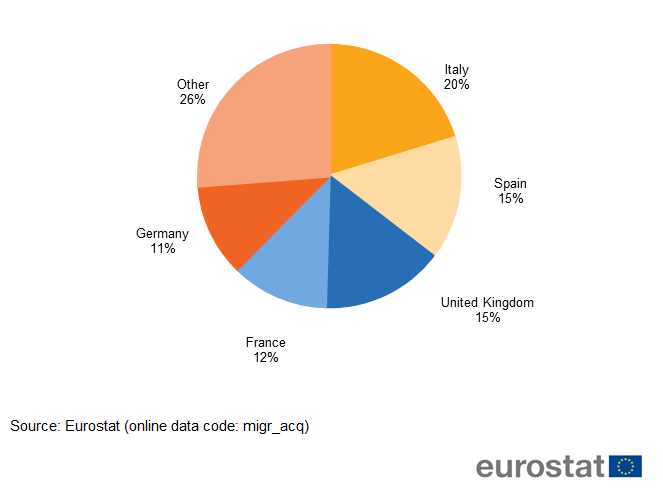
Brexit
As a result of the Withdrawal of the United Kingdom from the European Union, the opinion of both the European and British governments has been that British citizens would lose their European citizenship and European citizens would lose their automatic right to stay in the UK. To account for the problems arising from this, a provisional agreement outlines the right of UK citizens to remain in the EU (and vice versa) where they are resident in the Union on the day of the UK’s withdrawal. The only exception to this is citizens who possess dual citizenship with an EU state. This eligibility includes the majority of British citizens from Northern Ireland, who are automatically entitled to Irish citizenship as part of the Good Friday Agreement
The UK Government and EU have reached an agreement on the arrangements for EU citizens arriving in the UK and UK nationals arriving in the EU during the implementation period. These include the terms on which EU citizens will be able to stay here after its conclusion.
- After UK leaves the EU in March 2019, there will be an implementation period that ends on 31 December 2020 during which EU citizens and their family members will be free to live, work and study in the UK as they do now. This will also be the case for UK nationals moving to the EU during this period.
- EU citizens and their family members who arrive and become resident during the implementation period will be able to apply for temporary leave to remain, and after five years’ lawful residence, settled status, under the terms of the Withdrawal Agreement.
- The rights of those EU citizens arriving during the implementation period will be safeguarded on the same terms as has been agreed for those EU citizens resident in the UK before we leave the EU. Our factsheet from December provides more detail on these rights.
Summary of Member state nationality laws
This is a summary of nationality laws for each of the twenty-eight EU member states. [Source: Wikipedia]
| Member State | Acquisition by birth | Acquisition by descent | Acquisition by marriage | Acquisition by naturalisation | Multiple nationality permitted | |
|---|---|---|---|---|---|---|
Persons born in Austria:
|
Austrian nationality is acquired by descent under one of the following conditions:
show Conditions
|
|
|
Only allowed with special permission or if dual citizenship was obtained at birth (binational parents [one Austrian, one foreign] or birth in a jus-soli country such as USA and Canada) | ||
Persons born in Belgium who:
|
Belgian nationality is acquired by descent under one of the following conditions:
|
Yes—after 3 years cohabitation in Belgium |
|
Yes | ||
Persons born in Bulgaria who:
|
Bulgarian nationality is acquired by descent under one of the following conditions:
show Conditions
|
|
|
|
||
Persons born in Croatia:
|
Croatian nationality is acquired by descent under one of the following conditions:Conditions: born to Croatian parents born after March 1, 1991 and if parents are married at the time of birth, Croatian citizenship of mother the father is required should the parents happen to marry at some time after birth, citizenship is automatically granted to child retroactively. If the child is over 14 at that time, child’s consent is needed. ? |
|
|
Yes, but persons seeking to become Croatian citizens by naturalisation are to renounce foreign citizenship unless applying by ‘privileged naturalisation’ (e.g. descendants of Croatian emigrants) | ||
Persons born in Cyprus who:
|
Cypriot nationality is acquired by descent under one of the following conditions:
show Conditions
|
|
|
Yes | ||
Persons born in the Czech Republic:
|
No |
|
Yes, effective January 1, 2014[47] | |||
Persons born in Denmark who:
|
|
|
|
Yes, effective September 1, 2015[48] | ||
Persons born in Estonia who:
|
|
No (unless married to an Estonian citizen before 26 February 1992) |
|
Estonia does not recognize multiple citizenship. However, Estonian citizens by descent cannot be deprived of their Estonian citizenship, and are de facto allowed to have multiple citizenship. | ||
Persons born in Finland who:
(Possibility to obtain citizenship by declaration exists for inborn aliens who have lived a major part of their childhood in Finland.) |
Finnish nationality is acquired by descent from a Finnish mother, and from a Finnish father under one of the following conditions:
show Conditions
|
|
|
Yes | ||
At birth, persons born in France who:
[50] |
French nationality is acquired by descent under one of the following conditions:
|
|
show Naturalisation conditions
|
Yes | ||
| Persons born in Germany, if at least one parent has resided in Germany for at least 8 years and holds a permanent residence permit | German nationality is acquired by descent under one of the following conditions:
|
|
|
No, unless:
show Conditions
|
||
Persons born in Greece who:
|
Greek nationality is acquired by descent under one of the following conditions:
|
|
|
Yes | ||
Persons born in Hungary who:
|
Hungarian nationality is acquired by descent under one of the following conditions:
|
Yes After 3 years |
|
Yes | ||
Persons born in Ireland:
|
Irish nationality is acquired by descent under one of the following conditions:
|
|
|
Yes | ||
Persons born in Italy who:
|
Italian nationality is acquired by descent under one of the following conditions:
show Conditions
|
|
|
Yes | ||
| Persons born in Latvia who: | Latvian nationality is acquired by descent under one of the following conditions: | No |
|
Starting from October the 1st, 2013 hereby listed persons are eligible[53] to have dual citizenship with Latvia:
|
||
Persons born in Lithuania who:
|
Lithuanian nationality is acquired by descent under one of the following conditions:
|
|
|
No | ||
Persons born in Luxembourg who:
|
Yes3 years’ if residing outside Luxembourg and marriage to a Luxembourgish citizen. Right away, if residing in Luxembourg and marriage to a Luxembourgish citizen. |
|
Yes | |||
|
Maltese nationality is acquired by descent under the following condition:
|
Yes5 years of marriage to a Maltese citizen (if de jure or de factoseparated, then still living together five years after the marriage) or a widow/widower of a Maltese citizen five years after the marriage |
|
Yes | ||
Persons born in Netherlands who:
|
Dutch nationality is acquired by descent under one of the following conditions:
|
|
After 5 years uninterrupted residence, with continuous registration in the municipal register | No, unless:[55][56]
show Conditions
Persons over 18 with multiple nationalities must live in the Netherlands or the EU for at least one year out of every ten years, or receive a Dutch passport or a nationality certificate every ten years. |
||
|
Polish nationality is acquired by descent under one of the following conditions:
show Conditions
|
Yes |
|
Yes but in Poland, Polish identification must be used and the dual citizen is treated legally as only Polish | ||
A person who is not descended from a Portuguese citizen becomes a Portuguese citizen at the moment of birth, by the effect of the law itsef, if that person was born in Portugal and:
A person who is not descended from a Portuguese citizen and who is not covered by the conditions for automatic attribution of nationality by birth in Portugal set out above, has a right to declare that he or she wants to become a Portuguese citizen, and that person becomes a natural-born Portuguese citizen, with effects retroactive to the momement of birth, upon the registration of such declaration in the Portuguese Civil Registry (by application made by that person, once of age, or by a legal representative of that person, during minority), if that person was born in Portugal and:
|
Portuguese nationality is transmitted by descent under one of the following conditions:
show Conditions
|
|
show Naturalisation conditions
|
Yes | ||
Persons born in Romania who:
|
Romanian nationality is acquired by descent under one of the following conditions:
show Conditions
|
|
|
Yes[57] | ||
| Persons born in Slovakia who: | Slovak nationality is acquired by descent under one of the following conditions: |
|
|
Dual citizenship is only permitted to Slovak citizens who acquire a second citizenship by birth or through marriage; and to foreign nationals who apply for Slovak citizenship and meet the requirements of the Citizenship Act.[58][59] | ||
A child born in Slovenia is a Slovenian citizen if either parent is a Slovenian citizen. Where the child is born outside Slovenia the child will be automatically Slovenian if:
A person born outside Slovenia with one Slovenian parent who is not Slovenian automatically may acquire Slovenian citizenship through:
Children adopted by Slovenian citizens may be granted Slovenian citizenship. |
Slovenian nationality is acquired by descent under one of the following conditions:
|
|
|
|
||
Persons born in Spain who:
|
|
|
|
|
||
Persons born in Sweden who:
|
Swedish nationality is acquired by descent under one of the following conditions:
show Conditions
|
|
|
Yes | ||
| Persons born in United Kingdom who are “British by birth” (see separate article) | British nationality is acquired by descent under one of several conditions. See separate article section of “British by descent” for details. |
|
|
Yes | ||





